Linked Shooting
Linked shooting is supported, in which shooting with the sender camera automatically triggers shutter release by receiver cameras. You can perform linked shooting with up to 16 sender and receiver cameras in all. This is useful when shooting a subject from multiple angles at the same time.
For linked shooting, attach Speedlites or Speedlite Transmitters that support radio transmission wireless flash photography to the cameras.
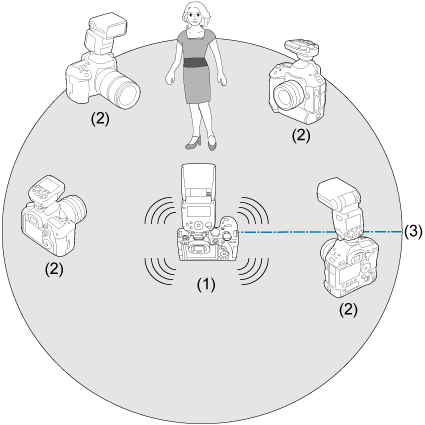
(1) Sender camera
(2) Receiver cameras
(3) Transmission range: Approx. 30 m / 98.4 ft.
Note
- For convenience in this guide, the EL-10 and the other cameras set up for linked shooting are referred to as the “sender camera” and “receiver cameras,” respectively.
Caution
- Shooting is not simultaneous, because receiver cameras shoot slightly after the sender camera.
Before following these steps, attach a Speedlite or transmitter to all cameras you will use in linked shooting. For instructions on setting up other devices, refer to the instruction manuals of the devices.
-
Press the
button on the
cross keys.
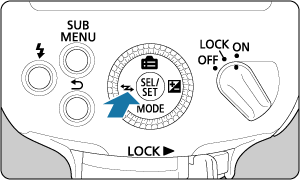
-
Set to
.

- Turn the
dial to select
, then press
.
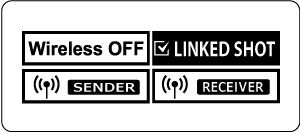
-
Display then changes to
.
- Turn the
-
Set as a sender or receiver.
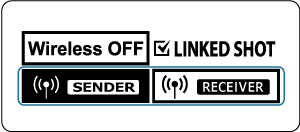
- Turn the
dial to select
or
, then press
.
- Turn the
-
Press
.
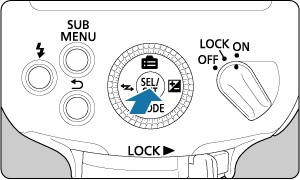
-
Select the option shown in (1).
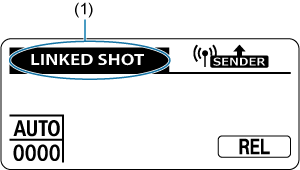
- Turn the
dial to select an option, then press
.
- Turn the
-
Set the flash mode.
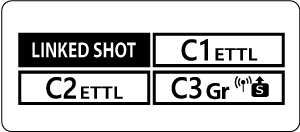
- Turn the
dial to select a flash mode, then press
.
- Descriptions next to
–
vary depending on the registered settings.
- For details on Custom flash modes, see Custom Flash Modes.
- Turn the
-
Set the transmission channel and wireless radio ID.
- For instructions, see Setting the Transmission Channel / Wireless Radio ID.
-
Set up shooting on the camera.
-
Set up all Speedlites.
- In the linked shooting setting, set up all Speedlites you will use in linked shooting as senders or receivers.
- Do the same for any transmitters you will use.
- Changing a Speedlite from receiver to sender in step 3 automatically changes other Speedlites (or transmitters) that were set as senders to receivers.
-
Position the receiver cameras.
- Position all receiver cameras within approx. 30 m / 98.4 ft. of the sender camera.
- Confirm that the
lamp of receivers is lit in green.
-
Take the picture.
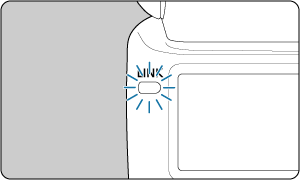
- Before shooting, confirm that the sender's
lamp is lit in green.
- Shooting with the sender camera automatically activates shooting by receiver cameras.
appears on the LCD panel of receivers that were used in linked shooting.
- Before shooting, confirm that the sender's
Note
- To cancel linked shooting, change the setting in step 2 to
on each Speedlite.
- This feature can be used for remote control of linked shooting even without attaching the sender Speedlite to a camera. Press
for the sender and select
to release all receiver cameras.
- Auto power off takes effect in approx. 5 min. in linked shooting, for both senders and receivers. If more time than this will pass between shots in linked shooting, set auto power off to [OFF] on both senders and receivers (C.Fn-01-1).
Caution
- Consider setting the lens focus mode switch to
on receiver cameras and focusing manually before linked shooting. Receiver cameras cannot shoot in linked shooting unless they can focus on subjects with AF.
- Flash can be fired in linked shooting when P.Fn-03 is set to [1] (), but if multiple Speedlites fire together, it may prevent suitable exposure or cause uneven exposure.
- Transmission range may be shorter depending on factors such as Speedlite positioning, the surrounding environment, and weather conditions.
- This linked shooting is equivalent to linked shooting with the WFT series of wireless file transmitters. However, WFT series transmitters cannot be used in this linked shooting. Also note that the shutter-release time lag differs from that of the WFT series.